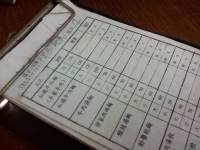超陽光新年活動!救公視!!!
陽光版以及所有癮科科的朋友們!大家好!!!
陽光妹這裡要提供一個
銀河系最超級無敵陽光,
刺眼到你散光,
參加後人生完全不一樣,
遇到氣質正妹不怕沒話聊的09新年活動。那就是:
搶 救 公 視
*網路連署
*參加遊行:時 2009 1月1日下午1點
地 自由廣場
路線 自由廣場 to立法院
公視對我們日常生活的重要性,相信很多人都不覺得重要。
但是公視的預算就要在2008年12月31日被立院凍結,以後公視的預算都會被立院逐項審理,
也就是如果真的變成這樣,公視就受制於政治力的牽制,
無法
公正公平公開公道公諸於世恭喜發財的做出像無米樂,大醫院小醫師等等的優質節目。
也就是你看第四臺新聞或節目看到想吐的時候也沒有別臺可以救你了!
你就只能吐出來!!!
這樣好嗎?????? ??????????
不好,這樣不好。
你可以尬酒尬到吐出來,但是不要看電視看到吐出來。
所以,
請各位至少參加網路連署,
如果一月一號沒事也可以到場散散步...
可以看到很多傳播學者..........
如果是要報考傳播相關科系的後進們,
千萬不要放過這個千載難逢的黃金契機,
這麼夯的議題搭配這麼多大頭傳播系老師,外加傳播系的學長姐,
可是你們推甄、面試、考試申論題的最佳良伴;
到場去跟他們拍個照也值回票價。
以下是落落長新聞時間,請選用...
-----------------------------------------------------------------------------------------------------------------------------
落落長新聞之一
各位關心台灣公共媒體發展的朋友好
立法院凍結公視4.5億預算,以及林益世委員提出公視法第13條修正案及附帶決議的作法已引起社會強烈反彈,至今已有六萬多人、近百個民間團體連署反對這項提案,包括侯孝賢、林正盛、魏德聖、楊力州、曹瑞原等一百多位電影及紀錄片導演也聯名反對,民間團體也計劃在2009年1月1日下午1:00遊行。
除了本地的不滿聲音,許多國際組織包括國際記者協會 (The International Federation of Journalists)、亞太廣電聯盟(Asia-Pacific Broadcasting Union)、以及大英國協廣電協會(Commonwealth Broadcasting Association)等,都表達嚴正關切。此事引起國際社會注意,已使新聞自由排名亞洲第一的台灣顏面全無,我們誠摯呼籲馬英九總統、王金平院長及史亞平局長正視此事,國民黨及林益世委應立即撤銷提案,審慎考量台灣的國際形象與觀感,勿讓台灣貽笑國際。
除了持續打電話給立委施壓,請您傳真給以下的相關單位,讓大家了解國際社會對此事的看法。
下方及附檔有相關資料,歡迎您修改並使用
總統府秘書長室:23832941;總統府傳真:(02)2331-1604;
總統府傾聽專線電話:(02)23206924
新聞局 傳真 23217981
立法院公共關係事務處(王金平院長):(02)2358-5255
國民黨黨團辦公室傳真:(02)2358-5681
行政院傳真:(02)3356-6920
林益世委員傳真:(02)23588225
落落長新聞之二
民間團體將發起1月1日元旦下午1點「搶救公視!監督國會」大遊行,歡迎參加!
2009年1月1日下午一點的「人體骨牌倒立院 搶救公視!監督國會大遊行」,從自由廣場走到立法院。邀請所有喜愛收看公共電視的觀眾一起來支持公廣集團,且媒體觀察教育基金會董事長管中祥與公民監督國會聯盟何宗勳一同呼籲 公共媒體獨立營運,不受政治力干預,並不表示公視不受監督,我們支持公視需要監督的主張,但堅決反對利用預算逐項審查,行政治控制之實的作法。要求立法院 應建立一套多元參與的監督公視機制,取代目前的政治力監督。
全國教師會的社會發展部主任許志文表示,公共電視的節目不同於其他商業電視台的節目,有非常豐富多元的兒童青少年節目,而這些節目幾乎是老師們的上課教材 之一,也是媒體識讀教育的正面教材。他認為,國外的公共電視是保持完全的獨立自主性格,絕對不會受到政府或政治力量的介入或控制,台灣目前對於公共電視的 控制,絕對是全世界各國前所未有的笑話。身為板橋社區大學學員、家長、PEOPO公民記者的陳昆龍則在現場念了一首送給公共電視的詩,這首詩的內容包括了 全家人對於公視的各類節目的喜愛,詩中有一句提到「如果沒有公共電視,教我們如何打開電視?」更是引起在場許多人的共鳴。
遊行訴求:
一、針對國會
1.要求立即開放隨選視訊系統
2.要求立即解凍4.5應捐贈給公視的預算
3.要求立即撤回箝制公廣集團營運的公視法第13條修正案及附帶決議
二、 針對公視
1.資訊公開:依照公視法資訊公開精神,將公視相關資料,及和行政、立法部門等往來公文全部上網公開。
2.產業民主:建立員工參與、共同決定,符合產業民主機制,董事會及管理階層應以最大的誠意與行動解決公廣集團勞資爭議。
3.公眾參與:建立公眾參與的外部評鑑與監督機制,並定期透過節目與外界進行溝通。
三、針對新聞局
1. 捍衛公視預算,拒絕立院提案,協助公廣集團真正公共化
2. 立即依無線電視公股處理條例精神,提撥華視負附擔捐贈,並買回華視民股。
無疆界記者組織聲明
Public media independence threatened, despite government denials
Reporters Without Borders urges President Ma Ying-jeou to keep his promises to us to respect public media independence. He wrote in a letter to our secretary-general: "We believe that accusations of this administration's interference in Taiwan's media are based on some wrong information or misunderstandings." But the organisation has had disturbing reports of ruling Kuomintang party decisions undermining the independence of the public media.
"Taiwan should be a press freedom model in Asia and the independence of the public media is one of the key components of a free and diverse press system," Reporters Without Borders said. "We want to believe in President Ma's promises but they must be translated into action."
The organisation added: "We are aware that political pressure on the public media is not new and existed under the previous government but it is vital that, regardless of political party debate, the media should have a favourable legislative and political environment. We urge the president to order a probe into the various accusations of meddling and to set up mechanisms that guarantee media independence."
In reply to a letter from Jean-François Julliard, the new Reporters Without Borders secretary-general, President Ma wrote that his government "will never attempt to control or interfere in the activities of the media." He added: "The ROC [Taiwanese] government is fully aware of the indispensable role that freedom of the press has played in the consolidation of our democracy (...) Both Taiwan's governing party and the opposition cherish the freedom our people enjoy."
In his letter, at the end of October, Julliard had requested an explanation for recent cases of political pressure on the state media, above all on Radio Taiwan International (RTI) and the Central News Agency (CNA). Julliard wrote: "Reporters Without Borders has been told that some officials used to be in the habit of calling journalists to ask them to rewrite stories. Nowadays, officials try to exert a more general control by appointing leading government supporters to run them."
The chairman and some ten other senior members of the Public Television Service Foundation (PTSF) - which oversees the Public Television Service (PTS), Hakka Television, Indigenous Television and China Television Service - issued a statement on 10 December condemning the ruling Kuomintang's attempts to control these media and calling for their independence to be guaranteed.
The Kuomintang's campaign to reaffirm its influence over the public TV stations seems to have strengthened since parliament's decision to freeze half of the PTSF's budget. At the same time, two parliamentary committees decided that the programming of Hakka Television, Taiwan Macroview Television and Indigenous Television should be subject to review by the entities concerned by their content. The Kuomintang legislators within this committee also called for the TPBS (Taiwan Broadcasting System or Public Television Service) budget to be conditioned on agreement with the Government Information Office (GIO) about content.
Influential Kuomintang lawmakers also proposed amending the public television law without a view to having a supervisory council controlled by the ruling party. According to several sources, legislator Lin Yi-shih said he would like to get rid of the outspoken "PTS News Talk" show.
Parliament, in which the Kuomintang has a majority, decided in October to appoint six new members to the PTS's supervisory board.
After Ma's election, RTI's chairman resigned in protest against GIO interference. CNA deputy editor-in-chief Chuang Feng-chia also resigned after condemning internal censorship on various subjects, including the president of China. He told Reporters Without Borders that the news agency "belongs to the country and not the Kuomintang." This was a few days after President Ma's campaign director was appointed as the CNA's deputy chairman.
In a letter to Julliard, the head of the GIO's International Information Department, Manfred Peng, denied any interference and accused the RTI and CNA officials of manipulating their reasons for resigning. He insisted that the GIO just conveyed listener comments to RTI's management without issuing any directives about content.
Chen Hsiao-yi of the Association of Taiwan Journalists told Reporters Without Borders that "interference has always existed and the parties always tend to put their friends in positions at the head of the state media."
RTI and CNA were in the past all directly controlled by the Kuomintang but, under President Lee Teng-hui (1988-2000), the state media were granted editorial independence and their funding was guaranteed as part of the GIO's budget. Article 11 of the public television law says that public television "belongs to all citizens and its operations must be independent and autonomous, and free of any interference."
落落長新聞 外國人看法之二
IFJ譴責立院對公視施壓
edia Release: Taiwan
December 11, 2008
Government Interference Puts Strain on Taiwan Public Media
The International Federation of Journalists (IFJ) holds grave concerns for the status of independent public media in Taiwan after the country's legislature announced increased control of funds, news reporting and programming of the national public television network.
According to media reports, on December 9 the Educational and Cultural Affairs Committee and the Interior Affairs Committee of the Legislative Yuan approved resolutions proposed by the ruling Chinese Nationalist Party (KMT) to enforce strict regulations on the operation and programming of the Taiwan Public Television Service (PTS). The service includes Hakka Television, Indigenous Television and the China Television Service.
The move comes one year after the legislature froze NT$450 million (about US$14 million) in funding for all programs under the auspices of the Public Service Television Foundation. The freeze affects half of the PTS annual budget.
In a statement on December 10, PTS said the new regulations, under which four of its channels could only disburse programming and production budgets after "item-by-item government approval", were "unjustified interference in our independence".
It had sought but failed to gain a clear explanation from government bodies of the rationale for the freeze.
"The Taiwan Government's efforts to exert strict controls on public television is a significant setback for Taiwan's media profession, whose ability to provide independent information and commentary to the general public is increasingly restricted," IFJ Asia-Pacific Director Jacqueline Park said.
"Journalism conducted in the spirit of public service is one of the pillars of democratic freedom. Heavy regulation of public media will undermine the right to freedom of expression of Taiwan, and thus the country's democracy."
The IFJ calls for an independent review of the resolutions passed by Taiwan's legislature and an investigation into the reasons for blocking funding to PTS.
For further information contact IFJ Asia-Pacific on +612 9333 0919
The IFJ represents over 600,000 journalists in 120 countries worldwide
落落長新聞 外國人看法之三
Asia-Pacific Broadcasting Union
Taiwan's public TV 'under serious threat'
Taiwan's Public Television Service (PTS) Foundation has warned that proposed new legislation seriously threatens the independence of Taiwan's public media.
The proposal by two parliamentary committees would prevent PTS, Taiwan Indigenous TV (TITV), Hakka TV and Macroview TV from using programming and production budgets without with prior, item-by-item government approval.
"The proposal legislation seriously violates the social consensus for all political parties to withdraw from media operation," the foundation said.
"If passed, it would signify the undoing of hard-won freedom of the media and democratic progress in Taiwan."
It said half of PTS' annual budget of US$28 million had been frozen by parliament for nearly one year despite PTS demonstrating good faith by submitting various operational plans and performance reports.
"Over the course of its history, PTS has never transgressed its designated role and has always respected criticism and suggestions from the legislature and society," the foundation said.
"However, we will never accept unjustified interference in our independence and will take whatever steps necessary to protect the freedom of public media and the core democratic values that the people of Taiwan have cultivated at great cost."
Wednesday 10 Dec 2008
落落長新聞 外國人看法之四
CommonHealth Broadcasting Association
Taiwan is in danger of losing independent Public Television Services
The Kuomintang (KMT) legislative caucus proposed new legislative measures on Tuesday (Dec. 9) that, if enacted, would violate the widely embraced principle of government and military non-interference in the Fourth Estate and deprive Public Television Services and its member channels, Taiwan Indigenous Television, Taiwan Hakka Television and Taiwan Macroview Television of their independence.
If the proposed legislation is passed, the above four public television channels would require prior item-by-item governmental approval for all budgetary dispersals. The KMT party holds an over three-quarters majority in the legislature. President Ma Ying-Jeou is a member and former KMT party chairman.
Public Television Services Foundation issued an emergency public statement on Tuesday evening critical of the proposed measures. In the statement, the foundation appeals to the public to support the independence of Public Television and uphold Taiwan's democratic values.













![[科技新報] 運動讓脂肪改過自新](https://www.iarticlesnet.com/pub/img/article/7586/1403826336194_xs.jpg)





![[23 12] iPhone iPad 限時免費及減價 Apps 精選推介](https://www.iarticlesnet.com/pub/img/article/4181/1403801469572_xs.jpg)


![[JB教學] JB不成功iPhone iPad不能開 教你預防及解決方法](https://www.iarticlesnet.com/pub/img/article/4178/1403801445323_xs.jpg)





![[Android App] 可愛的日系風 Speed Contact 電話簿](https://www.iarticlesnet.com/pub/img/article/11824/1403853732657_xs.jpg)